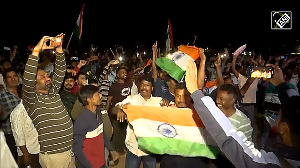
For a few hours, it was infinitely worse than September 11.
On that day two years ago, you saw the smoke at the bottom of Fifth Avenue, the absence of tall buildings, and knew something epochal had taken place.
There was fear and disbelief, but it was controlled. You were a small part of a great historical event. You were shaken but safe. Most of all, you were connected.
The television news, as it relayed endless images of a plane flying into a tower, framed the unimaginable and made it comprehensible. The Internet kept you informed and bonded with thousands of others. The telephone kept you in touch with loved ones; you were only a phone call away from reassurance.
This time, everything was different. You were an island, cut off from the community except the accidental ones that formed at a traffic light, or a front stoop. The only source of information was the radio, which became a lifeline as you sat in the dark. You were jittery even after you knew it was not a terrorist attack, just some sort of monumental power failure. You worried about cash, about when the ATMs would start working, about how long food and water would last, about whether you should stock up on essentials. It was like living in wartime.
I spent most of Thursday afternoon trying to get to a pay phone, since my cell phone stopped working. I was trying to call my wife. I walked up Second Avenue, against an endless stream of people all trying to get to Delancey Street and cross over the Williamsburg Bridge into Brooklyn.
| Tales From the New York Blackout |
| Unwired in a wireless world The Long March Home |
It was a surreal experience.
Two men had their SUV parked across the sidewalk, the radio blaring, as small groups of people gathered around them, listening to the news. The car was like a rock jutting out of the human stream, pedestrians skirting around it, some staying to listen.
I bumped into the old Cuban gentleman who potters around our building. He is an incredibly dignified presence, dressed in peaked caps, waistcoats and pleated pants. He keeps a piano in the garage. There are more than a dozen keys missing, it is a badly damaged instrument, but Mr Grant is as proud of it as if it were a concert grand in the best repair.
He is fond of telling stories about his family in Cuba. Each member played an instrument and in the evenings the people of their village would gather around to hear the music. I have found him a calming presence, always ready with a smile and a gracious word. "Hello," he would say with a nod, "terribly hot tonight."
This evening he was rattled and disheveled. His shirt was untucked. He was hatless. "It's the terrorists," he said, convinced the radio commentators were wrong. "They don't want New York to be okay. They're trying to keep us off-key. They hate us."
I found a pay phone with a line of people. The woman at the front was making call after call. Finally the man in front of me, exasperated, said: "Hey there are people waiting here." She put the phone down, glared at him, and went to the back of the line. When I finally got to the phone the number would not connect.
I wandered with the crowd, wondering what to do, and headed back home by habit. This time I was walking with the stream. A few feet from the front door of our building I saw a woman walking hurriedly. It was my wife.
Of the many things we saw later that night, one image stays with me. It was a limping, middle-aged woman, directing traffic on the corner of Second Avenue and Fourth Street, with a small red flag.
She was a volunteer, a New Yorker, who picked up the slack because she happened to be there. She would stop the traffic with the flag. She'd start it up again. Each time she'd drag herself back to the sidewalk, her bad leg trailing behind her. She was amazing to watch.
We all were.
Illustration: Uttam Ghosh
More Tales From the New York Blackout:






 © 2025
© 2025